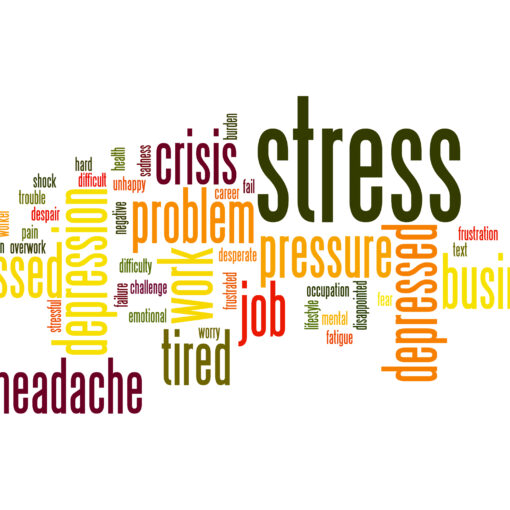Struggling to feel festive and jolly?

Does spending time with family make you anxious? Or is the opposite true? Does not being able to see loved ones lead to feelings of depression, guilt, or grief? Does the pressure to buy gifts for everyone make you feel stressed and overwhelmed? Do these feelings, combined with shorter days and colder temperatures take a toll on your mental health? If so, you’re not alone. “The most wonderful time of the year” isn’t always wonderful for everyone.
The holiday season is often accompanied by unwelcomed guests and pressure to cook, bake, clean, and entertain. Shopping and wrapping presents can bring on a great deal of stress as well. Are you torn over whether to send Christmas cards? Feeling guilty if you don’t and feeling overwhelmed if you do? It’s no wonder recent statistics show that almost 70% of Americans report feeling stressed from a perceived lack of time and money during the holidays(1). Over half of folks feel pressured to buy gifts during the holiday season as well (1). This stress can be amplified by the expectation that you are ‘joyful’ and ‘merry’ during this time.
Why Might the Holidays Be Hard?

The holiday season is portrayed in the media and in books as a wonderfully happy time. And sometimes, it is. Gathering with family, exchanging gifts, sharing meals, and singing holiday songs can be joyous. However, for some, they can also be really hard. There is a perception that the holidays are always happy, and that we should feel happy during them. Here are some examples of why the holidays may be harder (3, 4):
- Family overload: It’s no secret that family members can cause stress. Prolonged visits from immediate or extended family can be difficult – especially when awkward or confrontational conversations arise.
- Grieving loss: On the other end of the spectrum, the holidays can be a reminder of loss causing depression. Missing loved ones over the holidays can be especially difficult. You may notice that they are gone more so than other times of the year. Similarly, grieving someone who recently passed or who is no longer in your life can be very difficult.
- Loneliness: Sometimes, the holidays remind us how “single” we are. Watching loved ones and friends couple up with their significant other can be difficult. Loneliness is real and can cause symptoms of depression.
- Being pulled in too many directions: The holidays are a busy time of year. The end of the calendar year is fast approaching. Kids have school music concerts, activities and then are set loose for winter break. Family members are coming in and out of the house. You are traveling as well. Feeling as though you are on the run leaves little time for rest. Fatigue can result.
- Financial guilt: When it comes to spending money, the holidays are typically the most expensive time of the year. For some, this may be a financial burden that can lead to stress or guilt. You may want to buy expensive things for your significant other. Your kids may have asked for the latest and greatest piece of technology. Maybe your list of family members to buy for continues to grow. Pile on the additional expense of gatherings, parties and special dinners. It can be very overwhelming and stressful. Despite all that you are doing, you still have feelings of guilt at not doing enough.
- Healthy habits get difficult to maintain: With the holidays often come parties, nights out, big dinners, and baking. (Who doesn’t love a Christmas cookie or two or three?) However, it can be difficult to maintain healthy habits. When attending holiday parties and are busy with ‘everything else’, it can be hard to focus on sleep, diet and exercise.
- Pressure to be ‘merry’: As previously mentioned, the pressure to be happy during the holidays may be unrealistic. When we try too hard to be happy, we may end up faking it. This can lead to exhaustion and frustration. Additionally, if you have any other stress happening in life, it may be difficult to be genuinely happy.
This is not a comprehensive list of reasons for why a person may struggle over the holidays. There are many more life evets that can increase stress, anxiety, or depression. The important thing to remember is that, if you are struggling, you are not alone.
How to Manage Holiday Stress
It’s okay to notice and name the less-than-pleasant feelings that accompany the holidays. If we can name them, we can tame them. If you are feeling stressed, anxious, depressed, or overwhelmed during the holiday season, it is ok to admit you may need help. The nice thing about holidays, is they are predictable (5). They come around the same time every year. Knowing this can help you prepare for them Here are some ideas for how to help you get through one of the busiest seasons of the year (2, 5):
- Acknowledge your feelings: If you are lonely, depressed, grieving, or anxious, it is ok to recognize these feelings. Ignoring them and pretending to be happy will not help your mental health. Take time to grieve or to express your feelings to a safe person.
- Avoid hard topics with family: It can be uncomfortable to have tough discussions with family (think politics or religion). Set boundaries with these types of conversations and hold off on them until a more appropriate time. It’s ok to be different and these differences don’t need to cause stress or a large fight.
- Be realistic: It’s unfair for you or anyone else, to expect you to do ‘everything’. You don’t have to throw a giant holiday party if it’s too much. You don’t have to allow every family member to stay at your house if that becomes overwhelming or displaces you. Be realistic about what you can do. Prioritize events if necessary. If you are “adding” a new event, is there one that you can eliminate?
- Set a budget: Decide early in your shopping process how much you can afford to spend. Remember, bills still need to be paid and you still need to eat. It’s ok to give homemade gifts or to give something small. As cliché as it sounds, it’s the thought that counts.
- Plan ahead: Instead of scrambling at the last minute to see everyone or attend every party, make a pan for visits. Start shopping early and online if possible. Do your best to see the most important people first and go from there. And remember; it’s ok to say no to things.
- Prioritizing self-care: Doing healthy things that feel good is a key ingredient for optimizing feelings of health and happiness during the holidays.
- Focus on healthy habits: As previously mentioned, staying on top of your diet, exercise, and sleep routines is difficult. Do your best to continue exercising if that is a good option for you. Even taking a walk once a day outside can be helpful. If you know you are going to a party later in the evening, drink lots of water and eat well during the day. Try to focus on getting enough sleep as well. Your body and your health will thank you for it.
- Relax: The kids are on winter ‘break’ and you likely get some time off from work. The idea is to relax and enjoy the holidays. Consider practicing mindfulness exercises or taking a quiet moment to breathe. Practice healthy coping skills like listening to music, taking a bath, or reading a book. In the midst of all the “go”, find some time to slow down.
- Professional help: If you are currently in therapy, make sure you keep going. Despite all the busyness and holiday events, your mental health remains important. If you are not in therapy but feel you need it, it’s ok to reach out. Professionals are here to help, and telehealth has made them more available.

————————————————————————————
The holidays can be a wonderful time of year, filled with family, friends and joy. They can also be very stressful, depressing, and overwhelming. Avoid dreading the holidays by taking steps to keep yourself mentally and physically healthy. You don’t have to go through it alone. Be open and honest about how you are feeling. Focus on the people who mean most to you in your life, while balancing others who may also be important. It’s not your job to make everyone happy. This time of year can be hard for everyone, but there is still joy to be found.
If you are dreading the holidays, the new year, or the darkness of winter, now can be an excellent time to gain private, confidential support via telehealth or in-person mental health sessions with Wellness Matters therapists. Nowadays, getting mental health support and therapy is easier than ever before. The Wellness Matters intake process is all on-line, lessening the time and effort for getting started. On-line services make it possible to attend from the comfort from your home or office. In-person services may also be available.
Read about the therapists at Wellness Matters who provide private services (both by on-line and in-person) in the “About Us” tab. You can connect with the Wellness Matters Intake Coordinator by texting or calling 218-616-1276.
Article written by Emily Pierson, Contract Mental Health Therapist at Wellness Matters LLC
References/Resources
1. A Neuroscientist’s Advice for Combatting Stress this Holiday Season. The American Institute of Stress. Retrieved from: https://www.stress.org/a-neuroscientists-advice-for-combating-stress-this-holiday-season. Accessed November 29, 2021.
2. Stress Depression, and the Holidays: Tips for Coping. The Mayo Clinic. Retrieved from: https://www.mayoclinic.org/healthy-lifestyle/stress-management/in-depth/stress/art-20047544. Accessed November 29, 2021.
3. Why Are the Holidays so Stressful? US News. Retrieved from: https://health.usnews.com/wellness/mind/articles/2018-12-07/why-are-the-holidays-so-stressful. Accessed November 29, 2021.
4. 10 Common Holiday Stresses and How to Cope with Them. Psychology Today. Retrieved from: https://www.psychologytoday.com/us/blog/in-the-age-anxiety/201111/10-common-holiday-stresses-and-how-cope-them-0. Accessed November 30, 2021.
5. Managing the Seemingly Inevitable Holiday Season Stress. Verywell Mind. Retrieved from: https://www.verywellmind.com/understanding-and-managing-holiday-stress-3145230. Accessed November 30, 2021.




